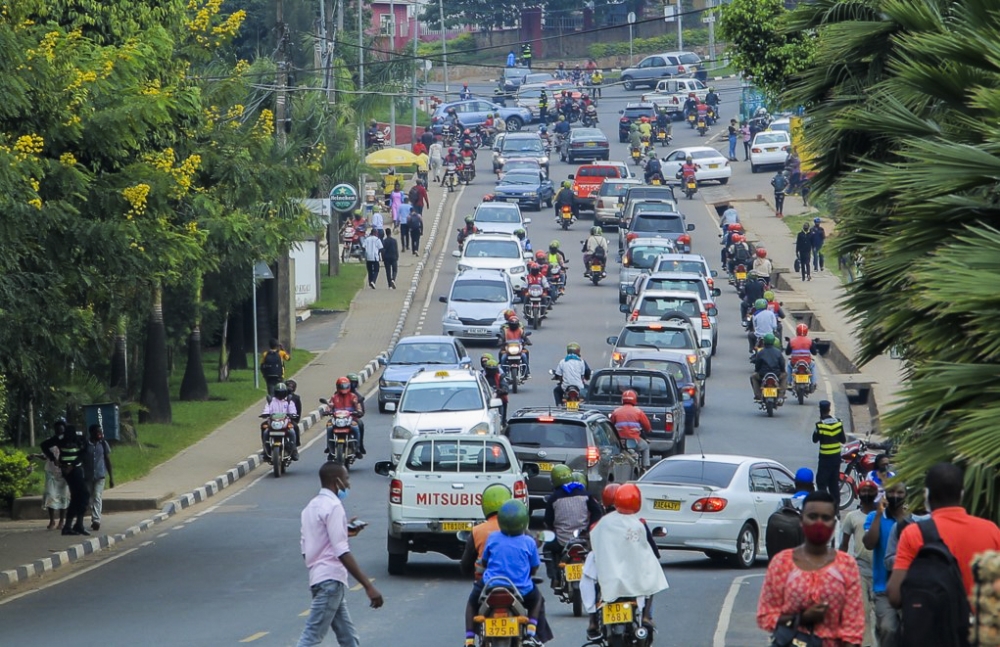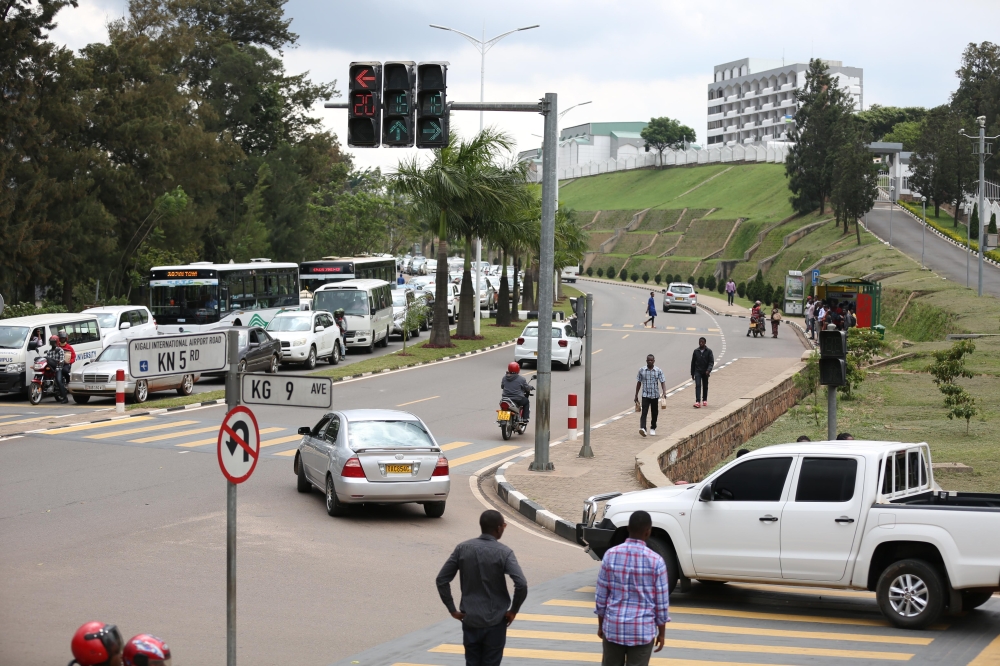

More Rwandans own and drive cars today more than ever, with current numbers, and trends showing that there are more cars on the roads than they were a decade ago – perhaps explaining the gradually increasing traffic congestion during peak hours.
ALSO READ: Is it possible to unlock Kigali’s peak hour jam
Going by the evolving nature of number plates, trends show that more Rwandans own private cars – a development, which officials link to socio-economic development, where more citizens, residents or even organisations can afford cars to use in their daily lives.
It is a trend that shows a more positive outlook for the country, but also comes with its own challenges, which include increased traffic congestion, demand for more roads, pollution, greenhouse gas emissions and more.
Available data from Rwanda Revenue Authority (RRA), shows that on average, each number plate series registers at least 24,975 private vehicles, going by the alphabet, with the exception of ‘O’, which is skipped, so that it is not confused with zero.


This means that from the time the number plates, which were issued beginning with RAA001A to the current number plates, which is RAH-V, there are more than 200,000 registered private cars in Rwanda.
On average, today a new number plate or letter is exhausted within a year or so, as opposed to 10 years ago and back, where a new number plate would take three to four years to be filled up.
The revenue authority says, however, that there are many more vehicles in the country – much as it does not give a total number of vehicles in Rwanda, but going by different recent reports, the number of cars in Rwanda could be well above 300,000, as of today.
"There are many other circumstances that cannot make us give an accurate figure because of the fact that there are many vehicles that are off-road for different reasons, but they were never reported,” the RRA official, who preferred to speak on condition of anonymity, told The New Times.
"The second reason is that there are vehicles that come from abroad, especially in neighbouring countries like Tanzania, Uganda, Kenya, DR Congo, South Sudan and other countries, which enter the country with temporary documents but sometimes they stay within the country,” he added.
This perhaps explains the increasing number of foreign registered vehicles in the country, seen on the streets in recent years, on top of many Burundian registered vehicles.
"Many of these cars with foreign number plates enter the country on temporary documents, which the owners can renew at any given time and extend their stay, but they can also leave any time,” the technical official said, explaining why we see many vehicles on the roads.
He further explained that sometimes some vehicles break down and are parked or are no longer roadworthy, but the owners never report, which means that technically they are not on the road but they are still registered in the system, which also complicates the process of computing the total number of vehicles in the country.
An upward trajectory
However, an April 2021 report on the status of motor vehicles in Rwanda showed that as of July 2020, the number of registered vehicles countrywide stood at 264,524, excluding security organs and government vehicles.
Among other things, the report indicated that the transport sector in Rwanda is rapidly growing, with an annual vehicle growth rate of 12 per cent, which goes to show that today more Rwandans are affording cars, more than they did ten or 20 years ago.
While car importation and ownership trends evolve over time, going up or down, based on different factors, one thing that is clear is that more Rwandans can own, rent or even drive a foreign-registered vehicle – thanks to regional integration.
Similarly, another report, the World Health Organisation (WHO) global status report on road safety issued in April this year shows that currently there are 270,673 vehicles in Rwanda, that number growing from 180,140 motor vehicles in the country in 2009.
That number does not include cars that are owned by say embassies, which are considered excluded from the general statistics, alongside those owned by security organs, many non-governmental organisations and international organisations, which have special considerations and an IT number plate.
There are also many vehicles imported and owned by the government, which normally carry the number plate ‘GR’ – to mean Government of Rwanda, and others in several government projects with ‘GP’ on the plaque.
With many countries opening up embassies or designating honorary consuls to Rwanda, it also means that the number of vehicles with ‘CD’ on the number plate, or ‘Country Diplomat’, have also increased tremendously, along with those with ‘IT’, and ‘GP’.
It is also worth noting that diplomatic missions have the exemption to import as many vehicles as they want while the number of NGOs and international organisations operating in Rwanda, many of which require vehicles, have also gone up over the past three decades.
When you put into consideration all these factors, and the fact that more Rwandans are affording cars today more than ever, the vehicle population in Rwanda is most likely above 300,000.
ALSO READ: Akagera Business Group and NCBA Bank deal enables easier and more affordable car ownership
As of 2023, Rwanda imported cars worth $52.6m compared to $33.03m spent on importing cars in 2022, the United Nations COMTRADE database on international trade, indicating a spike in car importations in the post Covid-19 era.
Cars are the 9th most imported product to Rwanda, with Japan maintaining the lead as the country where cars to Rwanda are imported from.
Currently, Rwanda imports cars worth $14.4m from Japan, followed by South Korea ($8.04M), South Africa ($5.97M), United Arab Emirates ($5.26M), and United States ($3.97M).
The report further shows that China is among the fastest growing import markets for cars for Rwanda, particularly in regard to electric vehicles, which the government incentivises in importation.
The years 2012, and 2016 are the years Rwanda imported the highest number of vehicles, while 2020 and 2021 recorded a dip in car importations due to the Covid-19 pandemic, the numbers going up again in 2021 and 2022.
The trend further shows an increase in electric vehicles, as the country seeks to minimise pollution caused by emissions from vehicles by giving importers of electric vehicles tax exemptions.
ALSO READ: Rwanda extends import tax exemption for electric vehicles
Other factors attributed to the increase of vehicle population in Rwanda include online platforms where people directly buy vehicles themselves and ship them, without going through other companies or agents.
Similarly, there are bank packages which give people the means and resources to buy cars, such as employees or salary earners.
Pierre Hakizimana, Managing Director Poveria Tech Ltd, which imports cars, says indeed they are seeing more Rwandans ordering vehicles from abroad, despite the cost of shipping cars going up post-Covid, for different reasons.
"If you look at the manner in which number plates are moving, it confirms this trend of more cars entering the country. Every time they introduce a letter, in a year or less it is full and they move to the next one,” Hakizimana said.
We are currently on ‘H’, but we are already on ‘V’, and it is not even a year since ‘H’ was introduced. This goes to show that indeed more people are buying cars or more cars are entering the country,” the trader explained.
Hakizimana added that with people becoming more aware of hybrid and electric vehicles, there are more people going for those as awareness continues.
"I would say people are more into hybrid cars but they are yet to fully get acquainted with electric cars. We see more institutions importing these types of cars to drive the government initiative but in terms of private purchases, the numbers remain low, especially for fully electric vehicles.
The down side
Much as it is a positive trajectory that can reflect economic prosperity, a recent publication by the Rwanda Environment Management Authority (REMA), shows that majority of the vehicles in Rwanda are mostly based on internal combustion engines (ICE), which are known to have negative impact on the environment.
Considering that the majority of the imported cars are second-hand vehicles which use diesel or petrol, they contribute to air pollution which is hazardous to health, emission of greenhouse gases that accelerate climate change and, in some cases, cause noise pollution, among other negative effects.
A study conducted by REMA in 2018 showed that the sources of air pollution in Rwanda were vehicle emissions which were the biggest contributor to poor air quality, especially in the City of Kigali.
It further indicated that the majority of transport related Greenhouse Gas (GHG) emissions are generated from burning fuel in combustion engines, warning that the country should switch to EVs to minimise the damage.


